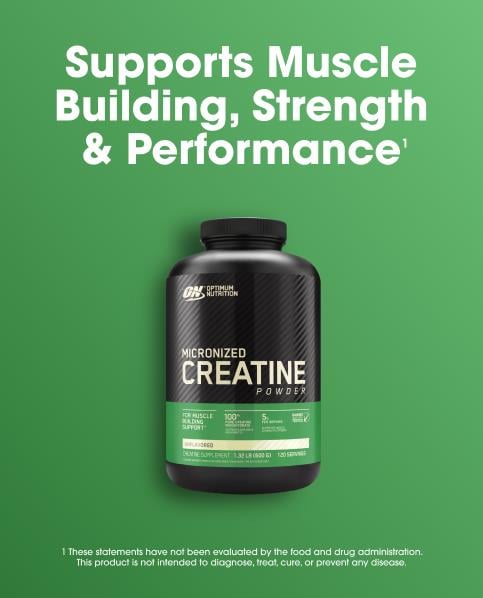Creatine is an increasingly popular supplement for those who are serious about achieving fitness goals. Through its various forms, creatine supplements can provide a range of benefits from increased muscle mass and strength to improved endurance so long as it’s used properly. If you’re considering taking creatine, understanding the different ways that it can help you with your workout plan is important. This article will provide an overview of creatine in fitness supplements, detailing the uses, benefits, side effects, and more to help you make an informed decision about whether it’s right for you or not.
Creatine Monohydrate was developed and began to become widely available in supplement form over the last 30 years, but it was discovered in 1832 by a French scientist. Today it is the most extensively studied and widely used form of creatine on the market!
What is Creatine?

Creatine is a naturally occurring compound produced by the human body in the liver, kidneys, and pancreas. It is predominantly found in our muscles and is produced from the amino acids arginine and glycine. During meaningful physical activity (such as weight lifting) creatine helps to provide extra energy throughout muscular contraction.
Creatine helps increase ATP (adenosine triphosphate, the body’s main source of energy) production during muscle contraction, which in turn improves overall muscle performance. This improved performance can translate to increases in strength, power output, and improved recovery time between sets. Supplementing with Creatine has been shown to increase lean muscle mass as well as reduce fatigue levels during exercise.
An average adult stores about 100-120 grams of creatine in their body and serving size for supplementation usually ranges between 5-10 grams depending on any personal goals or restrictions. The goal of creatine supplementation is to saturate the muscles with more creatine than what’s found naturally within the body. This concept is often referred to as ‘loading’. Loading initiates what’s called a ‘super-compensation’ effect where once the cells reach maximum saturation levels they then remain at that particular point until depletion occurs when energy demands exceed capacity.
Creatine in Fitness: How Does it Work?

The ability of creatine to enhance physical performance and improve athletic results has been
researched
extensively throughout the years. Typically, while supplementing with creatine, an individual begins by ‘loading’ or increasing their body’s natural creatine storage levels beyond the average capacity of 120g for an adult human through a period of administration over several weeks.
The use of ‘loading phases’ is often used when first beginning to take creatine as it enables the body to reach maximum saturation strains quicker than when taking small doses over a longer period of time. After loading, intake is then maintained at lower dosages (often 5g all the way up to 25g) by continuing supplementation.
Creatine has a range of uses depending on the sport and activity being undertaken. During
studies
, it was observed that participants using performance-enhancing substances such as creatine powder had increased muscle mass, strength benefits, better concentration abilities, and stronger joints which enabled them to handle higher-intensity exercises over prolonged periods without exceeding fatigue limits. It can also be extremely useful in assisting recovery from strenuous activities where greater muscle damage is experienced due to its ability to replenish energy reserves quickly – thus reducing muscle soreness and improving recovery time following strenuous workouts.
The most common forms of Creatine you can find on the market include Creatine Monohydrate (CM), Creatine Ethyl Ester (CEE), Micronized Creatine, Creatine Magnesium Chelate, Buffered Creatine, Creatine Hydrochloride (HCl), and Creatinol-O-Phosphate (COP). Each form serves slightly different purposes. So, trying out each one would be beneficial in deciding which works best for your individual goals.
My personal advice is to use monohydrate and you will be fine, but if you feel some side effects with the gut, then I recommend using the hydrochloride form of creatine.
Key Benefits of Creatine Supplementation

Creatine supplementation has proven to provide several benefits when it comes to performance and overall health. A few of the key benefits include:
-
Improves Strength & Muscle Mass
Supplementing regularly can increase muscular power, strength, and size. It doesn’t solely apply to muscle cells, as creatine can improve general physical capabilities including, but not limited to sprinting, jumping, and throwing events.
-
Supports Endurance & Recovery
Studies
show creatine can be beneficial in assisting recovery by decreasing soreness following activity, allowing you to repeat efforts more quickly with improved strength and power each time. By increasing your body’s natural ATP production levels your body is able to go for longer without running out of energy reserves during strenuous activities.
-
Enhances Fat Loss
Research
suggests that those taking creatine as part of their training regime have an increased rate of fat loss due to an improved ability to maintain exercise intensity for prolonged periods which helps minimize post-workout fatigue & exhaustion, ultimately making it easier to manage a calorie deficit diet plan and burn more calories in relation to those who are not supplementing with creatine.
-
Brain Power
At this point, there’s
evidence
linking short-term cognitive boosts from the use of creatine supplements as well as improvements in behavioral tasks such as memory formation, and reaction times plus even developing greater problem-solving capabilities when actively engaging with challenging brain-stimulating tasks.
In conclusion, by utilizing creatine supplementation an individual could potentially see a range of both physical and mental benefits that prove beneficial across various activities whether for sport or everyday healthy living demands – provided that all associated instructions are followed correctly!
Potential Risks and Side Effects

Creatine is generally considered to be safe when taken in the recommended dosages. However, it may cause some mild side effects that are related to digestive issues. These side effects can include stomach cramps, bloating, nausea, and diarrhea. These typically go away after a short period of time, but if they do not, you should talk to your doctor about adjusting your dose and diet.
The potential risks associated with long-term use of creatine
supplements
tend to be limited to athletes who take excessive amounts compared to actual supplement guidelines. Women may also experience water retention due to supplementation which could result in weight gain, so it’s important for all users (but especially females) new or returning from prolonged non-usage periods, to take caution over their exact dosage intake & cycle frequency when first beginning any new supplement program. Ultimately, larger doses can appear more attractive due to the possibility of improved results & quicker performance enhancements – but able trending figures suggest consistently following regular official dosage guidelines leads towards optimal health gains!
Overall before undergoing any kind of supplementation, it is recommended that one speaks with a medical professional prior for advice on health status in order to reduce the chances of any negative repercussions resulting from ingestion. A balance between exercise intensity accompanied with appropriate dietary choices returns the best possible results – alongside making sure you adhere to regularly recommended daily dosages laid out by qualified professionals otherwise unwanted outcomes & health risks can occur!
Interactions and Considerations

Before taking any supplement, it’s important to understand how it might interact with other drugs or nutrition strategies that you’re currently using. Creatine can interact with diuretics, so make sure to talk to your doctor before using creatine if you are taking any prescription medication.
It’s important to consider that while
research
suggests creatine supplementation is generally safe in regards to performance enhancement – dosage isn’t always a guarantee of improved results & in some cases depreciates training performance. Also don’t forget stress management and proper restful sleep patterns should never be overlooked when considering the overall wellbeing of an individual! Getting 7-8 hours of sleep per night along with appropriate recovery times between exercise sessions can prove equally as beneficial (if not more so) than the regular use of supplements!
Ultimately it’s key that users follow the official dosages recommended by professionals and educate themselves on all possible risks & interactions prior to going ahead with any supplementation plan. Only then you would be able to understand whether supplement usage could be beneficial for your own individual goals over the longer term – rather than relying solely upon short-term performance gains you may initially experience during loading stages!
Recommended Dosage and Usage

It is recommended that creatine be taken at dosages of 3-5g per day. Typically users would initially begin with a loading phase. This can last between 4-6 weeks depending on a user’s individual goals – or whether they’ve used supplements before. During the loading stages, it is recommended to take 20-25g per day in divided doses around
training sessions
. After the loading phase has been completed, most users will then go into maintenance where intakes are reduced – typically sitting around 5g per day during this phase. It’s important to recognize that lower doses may return better long-term performance outcomes compared to higher-based ones as clinical
studies
support!
Creatine can be taken with other macronutrients such as proteins, fats, or carbohydrates which usually helps absorption levels along with providing positive indicator signs based on observing your fitness progress over time. Provided you combine regular supplementation alongside an appropriate exercise program plus an accompanying nutritional diet plan you should witness recovering results quicker rather than later! A good habit to get into would be noting down dosages throughout any cycle period just in case different performance plateaus are reached and adjusted accordingly – as sometimes constant changes need to be made that were originally unorthodox to succeed best for current objectives in mind!
Key Takeaways
Creatine supplementation available in many forms on the market nowadays provides a range of physical & mental enhancements to help improve performance across various activities including strength & muscle mass building, supporting endurance & recovery from strenuous activity, and enhancement of fat burn rates depending on individuals’ needs.
While supplementing with creatine is generally considered to be safe when taken appropriately, potential side effects such as digestive-related issues may creep up if not followed through correctly – always seek advice from medical professionals or qualified trainers prior to beginning any new regimen!
Furthermore, takeaway points include reducing high doses found with loading phases & adopting lower ones from maintenance phases instead for optimal results over longer periods – all of which combined with regular exercise plans plus a healthy diet should yield the best possible well-being outcomes along the way!

 By myulikeadmin
By myulikeadmin



